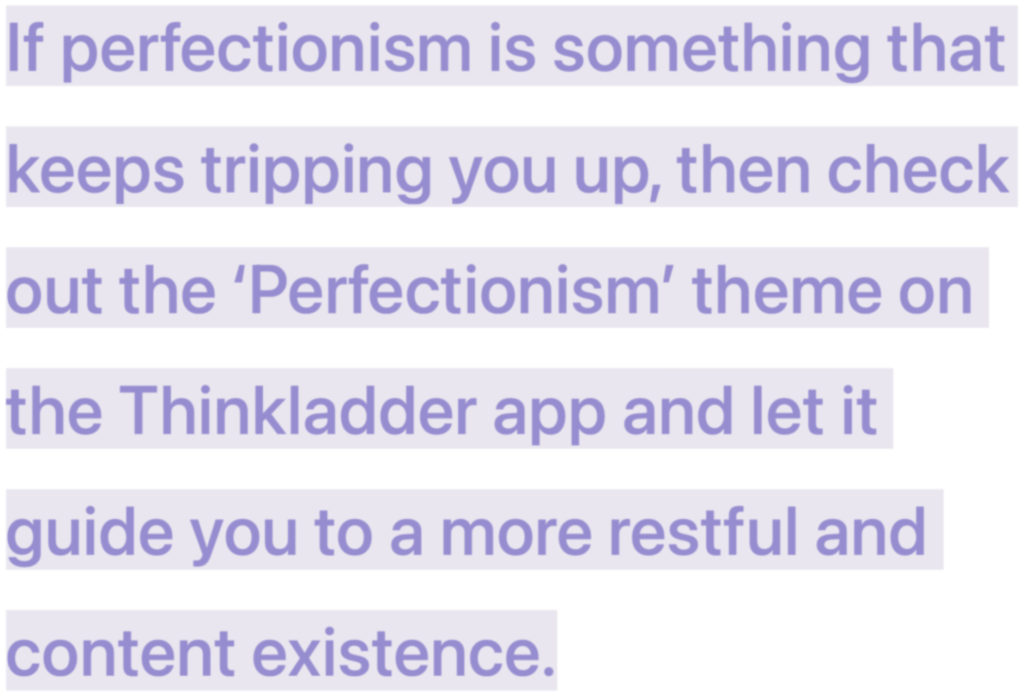Try out the Perfectionism Theme on the Thinkladder app here:
Perfectionism is a trait that is often lauded by society, regardless of how much pain it causes the perfectionist. Perfectionism can be difficult to escape because it masquerades as a friend.
When we strive for the best in our work and endeavours, others often appreciate being the recipient of our efforts. However, perfectionism is an inner slavedriver. It pushes us beyond our limits, and stops us from appreciating and celebrating the very good things we have done.
At the heart of our quest for perfection are limiting beliefs that feed our behaviour. These are things like, ‘If it contains one flaw or mistake, it’s worthless,’ or ‘My outer world must be perfect to make my inner world safe.’ If we want to release ourselves from relentless perfectionism, we need to challenge these beliefs. We can then replace them with truths to dismantle their power in our lives.
If trying to get things ‘just right’ is something that keeps tripping you up, then check out the ‘Perfectionism’ theme on the Thinkladder app. Let it guide you to a more restful, content existence and help you find balance.
Insights from the Perfectionism Theme
Excellence doesn’t call for flawless perfection, but for doing the best I can with the available resources.
Practical tips for dealing with perfectionism:
Set realistic goals: While setting challenging goals can provide motivation and a sense of purpose, perfectionists tend to swing a little too far by setting impossibly high standards for themselves. During the goal-setting process, take an intentional moment to check in and ask yourself, “Are these expectations realistic and achievable?”
Embrace mistakes: Nobody is perfect, mistakes are an inevitable part of life, and failure is a natural part of the learning process. Try to embrace your mistakes as an opportunity to grow and improve.
Practice self-compassion: Be kind and understanding to yourself when you make mistakes or fall short of your expectations. Take a moment to acknowledge the emotions you’re feeling and treat yourself as you would treat a friend who is struggling.
Focus on the process, not just the outcome: Perfectionists tend to be outcome-focused, but it’s important to also appreciate the process of getting there. Enjoy the journey, not just the destination.
Prioritise self-care: While perfectionism can drive you to do your best work and achieve great things, it can also lead to excessive stress, self-criticism, and ultimately, burnout. Taking care of yourself is essential for maintaining a healthy balance. Make time for relaxation, hobbies, and activities that you enjoy.
Get support: Surround yourself with people who support you and can help you work toward a healthier approach to life. Consider talking to a therapist or coach who can provide guidance and support.
Challenge limiting beliefs: Perfectionism often comes with negative self-talk, stemming from unhelpful beliefs. Challenge these limiting beliefs by finding evidence to support a more helpful way of thinking. Thinkladder is an excellent resource for guiding you along this process. You’ll start by identifying the symptom, discover the belief fuelling it, and finally find uplifting and empowering insights.
Remember to be kind and compassionate to yourself as you work on breaking the habit of perfectionism. With time and effort, you can learn to find balance.
Perfectionism can often be a contributor to procrastination, another topic we’ve covered in the Thinkladder app. Find more information on it here.


